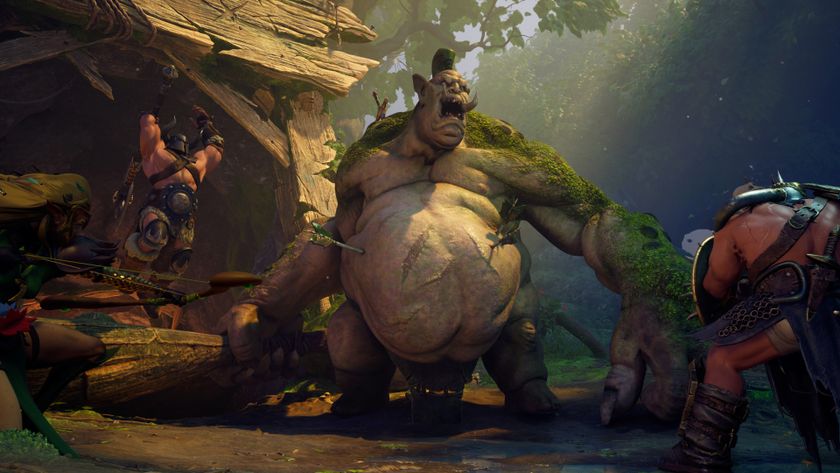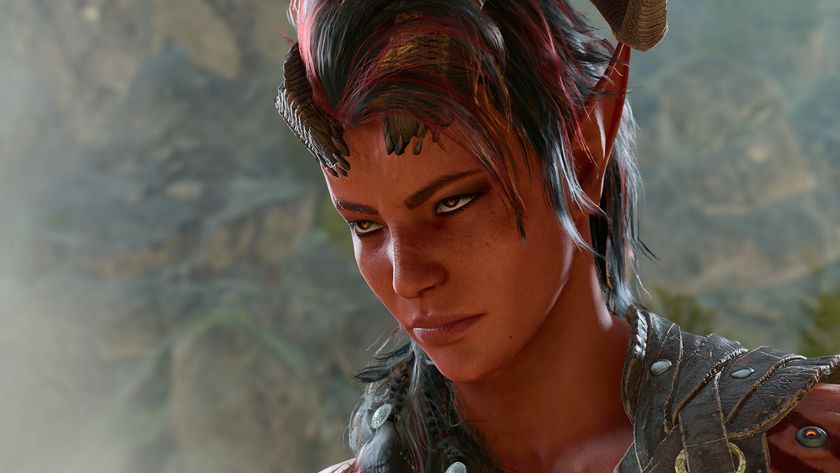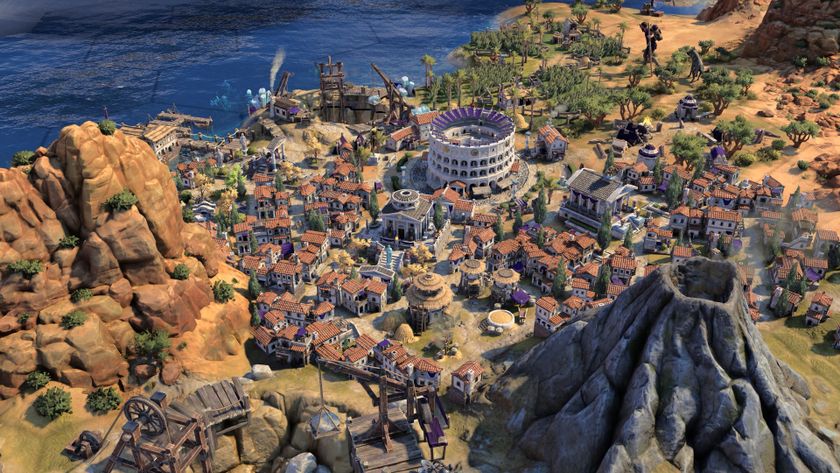Evan: Reddit threads like "Holy shit, the loot boxes are out of control" (7,200 upvotes) are popping up on a daily basis, and resentment of paid rewards feels like it's at an all-time high. I don't think it's any sudden trend, it's just that time of the year when 'big' games are releasing in clumps from publishers that will have noticed that Activision Blizzard made $3.6 billion from in-game content in 2016. How do we feel about it?
Wes: I think the fact that loot boxes have crept their way into singleplayer games is what has so many people mad. Now they're everywhere, and they threaten to make videogames samey in a way that depresses me. When I sit down to play a game, I don't want to feel like I'm using a 'product.' In Overwatch I'm trying to absorb myself in the intensity of a competitive shooter, focusing on the flow of aiming and dodging. Or I'm trying to immerse myself in rich storytelling in a game like The Witcher 3. Or I'm obsessing over earning gold medals in every race in Burnout Paradise, because I want to see my skill rewarded with an expanding stable of cool cars.
The point is, the way I engage with all of those games is totally different, and the way they're designed is totally different. They should be, because there's no one-size-fits-all solution for how earning rewards in a game should work.

James: I’m with you there, Wes. Loot boxes often stand in for more interesting reward systems. Take Destiny 2, for example. Its loot boxes, Bright Engrams, are rewarded for either earning a set amount of experience or by spending money. They primarily reward cosmetic items, or items that don’t drastically affect character progression. The exception is weapon mods, but that entire system is awful and worth its own piece. I’m always excited to decrypt Bright Engrams when they drop and I’m never starved of what they reward, but earning them doesn’t require performing any specific feats or playing particular modes. Loot boxes end up diluting reward systems, transforming in-game economies and personal milestones into arbitrary, boring tests of persistence.
Evan: It was upsetting that Bluehole went back on its pledge to not include loot boxes until after release.
Samuel: I agree that their presence in singleplayer games is the worst thing, here. With multiplayer games, there are associated costs with running a game after release where loot boxes might mitigate that, but let's face it—for singleplayer games it's only about profit. Even if we, as critics, say 'this game isn't affected by them', it's far from an endorsement. Having to explain that, and for consumers to learn what role they play in each game, is a problem developers and publishers have created. I don't want loot boxes to exist in singleplayer games at all. Any developer or publisher that chooses to add them to a singleplayer game surely knows that they're courting this type of drama.
Loot boxes make games homogenous
Wes: Right, one of the great joys of playing videogames is discovering the boundaries and rules of an original world. Even in the shared language of games—if you understand Mario you'll also understand Super Meat Boy—the limits of what you can and can't do and the logic of the world is always different.
The biggest gaming news, reviews and hardware deals
Keep up to date with the most important stories and the best deals, as picked by the PC Gamer team.
Loot boxes fundamentally impact that freedom of design, because some game system will have to be designed around randomized payouts with tiers of scarcity. That doesn't mean games with loot boxes can't be fun, but I'm worried about the erosion of creativity that could come from more and more games being designed around a mandatory loot box core.
I think a lot of people would agree that that the loot box goldrush is now regularly straying into gouging.
—Tim
Tyler: Totally. I really enjoy Absolver's random clothing drops, for instance. I had to grind for my most fashionable masks and boots, but grinding in Absolver is playing the game—fighting other players and winning—so it's what I'm there to do anyway. If you see a player wearing a bunch of cool stuff, you know they've done a healthy tour of the arena. But if you could just buy loot boxes with a guaranteed rare item? Fancy clothes wouldn't mean squat. It would totally change the game. If I'm wearing a mask that dropped after a tough fight with another player, I remember that story. I don't remember popping open Overwatch loot boxes. So loot boxes aren't just something you can tack onto a game without fundamentally changing it.
Tim: I'm even less sympathetic to Destiny 2's Bright Engrams than James is. Game director Luke Smith mounted this defence of the new gear shader system, and while he was right to say you'll end up flush with them, what he failed to add was that those would be the shitty brown ones, and most of the nice shiny stuff would be gated in the boxes. Having played Destiny for three years in advance of its arrival on PC later this month, it's been fascinating and disheartening to watch that game's microtransaction store evolve and spread. At first the items really were purely cosmetic, and limited in scope, so many players passed it off as entirely optional. These days you can buy 'fireteam medallions' which boost your chances of getting loot drops. If it isn't pay to win, it isn't far off it.
The same goes for The Division, which has struggled from a Saharan sized content drought that threatened to kill the game entirely, and yet the developers have still found the resources to introduce loot boxes. It sucks to have the endgame of a looter-shooter reliant on either getting lucky with drops or dipping into your wallet. I get that we're just talking about outfits to play dress up with (The Division's boxes mostly contain shoes, winter jackets and lurid weapon skins), but when there isn't much else to grind for, the feeling of being pressured to pay becomes more pronounced.
James: Worse, loot boxes in games built around the loot grind are especially dangerous. The Division, dumb as its stat-boosting backpacks are, runs along a dopamine track already. Throw monetized incentives into a vulnerable playerbase and I feel like I get the right to name anyone making the calls exploitative. I need my blue scarves, Tim! More than water or light or other colors of scarves!
Where do you draw the line?
Tim: I think a lot of people would agree that that the loot box goldrush is now regularly straying into gouging. And the irony is it's the most dedicated players who're likely to pay up, but at the eventual cost to the developer of a weakening relationship with that base. It's no wonder there's so much talk (and often accurately) of toxicity and entitlement in gaming communities, when too often players are treated like mug punters, there to be exploited by data analysts with MBAs.
Bo: I think that's a critical point, Tim. While I think it's a bit of a stretch to say that loot boxes are a form of gambling, there's no denying that they are designed to appeal to addictive behavior, which we've delved into the science of. So at what point do loot boxes cross from being a healthy way to inject some additional content to being an exploitative system designed to generate as much money as possible?
To me, there are three cardinal rules of loot boxes: they should only exist in multiplayer games, all loot should be cosmetic, and either they or everything in them can also be obtained through non-monetary means.
Tim: We both play Hearthstone, Bo, and I know you don't spend anything on it, which is admirable, I must have thrown many 100s of dollars Blizzard's way by now. I tend to buy enough packs to build most competitive decks, which as our recent report detailed, has become substantially more expensive over time. I'm more phlegmatic about packs, though, because I feel like the whole model is integral to the way the game works and has been since day one. Certainly, other card games are (much) more generous, but at least I'm going in with open eyes. I know what the drop rate is, I know how much I'll likely need to spend in order to compete, and this is how the game has always been.
What's much more jarring to me is seeing loot boxes just jammed into every triple-A game because, hey, it worked for those guys so why shouldn't it for us. It just looks incredibly opportunistic. It's hard to conceive of a game like Hearthstone without some sort of microtransaction model. Star Wars Battlefront 2? Not so much.
Bo: Hearthstone absolutely is pay-to-win. But as you say, Tim, at least you know that going in.
Tim: I pulled a golden Rotface from a pack this weekend, Bo. I ask you who the real winner is here?
Tyler: Tim, you're right that there's a clear difference when it comes to Battlefront 2. It's a game about shooting, and the Star Cards just buff to your abilities, giving you an advantage in a game otherwise about movement and map awareness and aim. EA says it's about "creative" customization, and maybe there will be some really fun builds, but are the players I'm using them against going to think they're fun? And what if I don't pick up any cards for my favorite class? How much will I have to grind, or pay, to be creative? Right now nothing about Battlefront's loot boxes seems fun to me.
Samuel: GTA Online's Shark Cards get a bad rap every time I cover the game, and some of the recent vehicles in that game are now absurdly expensive if bought with real money. That said, in that game you always know what you're paying for, and if you're prepared to grind down, you can also buy them with in-game cash. It's the random element of loot crates that I dislike. I would never buy one on that basis. I already lived through Pokemon cards in the late '90s, thanks.
...But are loot boxes keeping game prices down?
Evan: OK—we're not gonna solve loot boxes in a single article, but someone address this popular counter-argument: loot boxes, season passes, and DLC are the things that are keeping the cost of your games at $60 or less. Games were $50 and $60 twenty years ago—adjusted for inflation, that's about $90 today.
Games cost more than ever to develop, and cost less than ever to purchase. Aren't the rich players essentially paying for everyone else's fun, and the continued updates to games like Overwatch? Isn't that better than us paying $90 USD for a big-budget game?
Tim: That's one of the great defences of loot boxes, that they enable developers to maintain a stream of post-release content and events. I say be very wary of that line. Bungie invoked it around the time the Eververse store launched, and I saw plenty of players think that we'd be getting actual new missions and such as a result of whales throwing down cash for emotes. But of course they never materialised outside of paid-for DLC expansions. Instead we got underwhelming week-long events like The Festival of the Lost and Crimson Doubles, which like the loot boxes themselves, were largely cosmetic. I actually have little problem with the notion of selling stuff as a game's life extends.

Wes: I'm sympathetic to how many millions of dollars triple-A games cost to make these days, and I hate the common story of a studio closing after missing sales expectations or getting layoffs after a game ships, regardless. But you know what? Those things happen anyway, with or without loot boxes. That speaks to a larger problem than loot boxes can solve. And I'm not buying that it's do-or-die for the publishers who decide how they monetize their games. Activision Blizzard made $6.6 billion in revenue this past year, and like you said, Evan, $3.6 billion of which was from in-game purchases. EA makes more than a billion dollars per quarter. Ubisoft is similarly massive.
Of course companies exist to make money, but that also makes loot boxes fair game for criticism. Loot boxes aren't about survival; they're about profit. Publishers choose to make their games bigger and more expensive year after year. Funding that escalation with a payment system that triggers the same impulses as gambling wasn't inevitable or unavoidable; it was a choice.
Chris: Something else to keep in mind: people love buying stuff. Games wouldn't have loot boxes if players didn't shell out for them en masse, same as Day 1 DLC and Season Passes and expensive Gold Editions with figurines and posters and all sorts of other useless crap that we collectively roll our eyes about. But they still get bought, because people love buying stuff. Complaints about Early Access games have been around since Early Access was invented, and what's still popular? Early Access games. Pre-ordering digital games is pointless (they won't run out), risky (the game may suck), and much-bemoaned (seriously, you probably shouldn't pre-order games) but what's often at the top of Steam's top sellers? A pre-order.
Samuel: Rocket League is an interesting example, and one where I see the logic for a $20/£15 game. Everyone gets free, refreshed content, and the crates are all cosmetic. The money helps support the costs of running the game and their esports initiatives. After 100 hours, I can't argue with that, since I'd never spend a penny on them myself.
There's still more to unpack on this topic, and we'll keep discussing and reporting on loot boxes over the coming months. How do you feel about them?
The collective PC Gamer editorial team worked together to write this article. PC Gamer is the global authority on PC games—starting in 1993 with the magazine, and then in 2010 with this website you're currently reading. We have writers across the US, UK and Australia, who you can read about here.

To make its fantasy extraction game, this studio of ex-Blizzard devs had to teach itself the art of third-person combat design: 'There's a science to how those are built'

Karlach voice actor offers a pre-emptive no thanks to Disco Elysium successors that don't include the original project lead: 'Miss me with that casting call'
Most Popular






